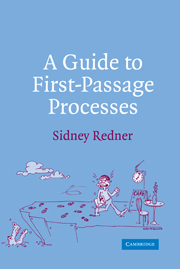Book contents
- Frontmatter
- Contents
- Preface
- Errata
- 1 First-Passage Fundamentals
- 2 First Passage in an Interval
- 3 Semi-Infinite System
- 4 Illustrations of First Passage in Simple Geometries
- 5 Fractal and Nonfractal Networks
- 6 Systems with Spherical Symmetry
- 7 Wedge Domains
- 8 Applications to Simple Reactions
- References
- Index
7 - Wedge Domains
Published online by Cambridge University Press: 05 August 2012
- Frontmatter
- Contents
- Preface
- Errata
- 1 First-Passage Fundamentals
- 2 First Passage in an Interval
- 3 Semi-Infinite System
- 4 Illustrations of First Passage in Simple Geometries
- 5 Fractal and Nonfractal Networks
- 6 Systems with Spherical Symmetry
- 7 Wedge Domains
- 8 Applications to Simple Reactions
- References
- Index
Summary
Why Study the Wedge?
We now investigate the first-passage properties of diffusion in wedge domains with absorption when the particle hits the boundary (Fig. 7.1). There are several motivations for studying this system. One is that first passage in the two-dimensional wedge can be mapped onto the kinetics of various one-dimensional diffusion-controlled reaction processes. By this correspondence, we can obtain useful physical insights about these reactions as well as their exact kinetic behavior. These connections will be discussed in detail in the next chapter.
A second motivation is more theoretical and stems from the salient fact the survival probability and related first-passage properties in the wedge decay as power laws in time with characteristic exponents that depend continuously on the wedge opening angle. This arises, in part, because a wedge with an infinite radial extent does not have a unique characteristic length or time scale. One of our goals is to compute this exponent and to develop intuition for its dependence on the wedge angle. These results naturally lead to the “pie wedge” of finite radial extent that exhibits an unexpected discontinuous transition in the behavior of the mean exit time as the wedge angle passes through π/2. This feature also manifests itself as a pathology in the flow of a viscous fluid in a wedge-shaped pipe [Moffat & Duffy (1979)].
Finally, the first-passage properties to a sharp tip (wedge angle > π) is an essential ingredient in diffusion-controlled growth processes, such as dendrites, crystals, and diffusion-limited aggregates. The stability of such perturbations depends on whether the first-passage probability is largest at the tip or away from it.
- Type
- Chapter
- Information
- A Guide to First-Passage Processes , pp. 234 - 251Publisher: Cambridge University PressPrint publication year: 2001



